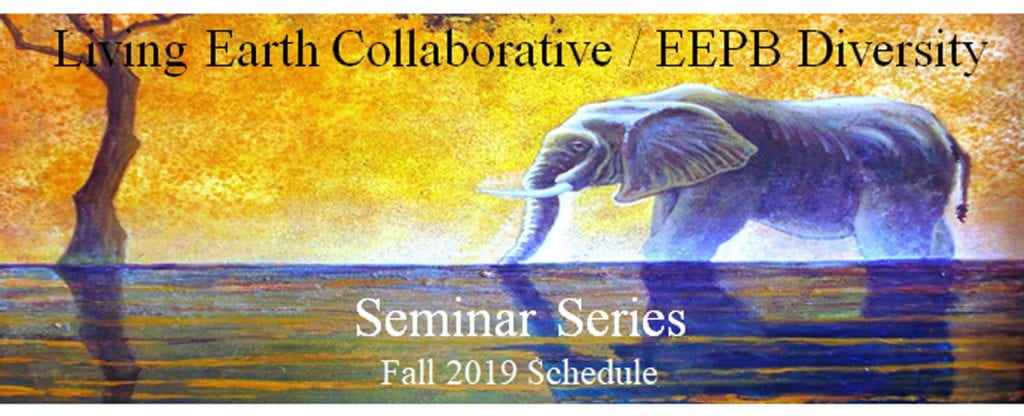
The Living Earth Collaborative and the Evolution, Ecology and Population Biology Graduate Program are hosting seminars on alternate weeks this fall. The seminars are held in Rebstock 322 and are open to all. Light refreshments will be available.
August 29
Jane Melville, Museums Victoria, Melbourne, “An Integrative Approach using Phylogenomics and High-resolution X-ray Computed Tomography (CT) for Species Delimitation in Cryptic Earless Dragon lizards (Genus Tympanocryptis) from Australia”
September 5
Sacha Heath, Living Earth Collaborative, “Avian Ecology and Pest Reduction Services in a Temperate Agroecosystem: Inferences for Conservation and Farming”
September 12
Natalie Mueller, Department of Anthropology, Washington University, “Experimental and Ecological Approaches to Plant Domestication: the Case of North America’s Lost Crops”
September 19
Brett Seymoure, Living Earth Collaborative, “Lighting up Biodiversity: The Visual Ecology of Natural and Anthropogenic Light Cycles”
September 26
Mike Moore, Living Earth Collaborative, “Temperature and the Evolution of Breeding Coloration”
October 3
No seminar this week due to Chancellor’s Inauguration
October 10
Kristin Winchell, Washington University, “Models for Urban Evolution: Adaptation, Tolerance and Convergence in Anolis Lizards”
October 17
William, Farfan-Rios, Living Earth Collaborative, “What Happens When Andean-Amazonian Forests Get Hotter?”
October 24
Elizabeth Carlen, Fordham University, “From City to Megalopolis: The Ecology and Evolution of Feral Pigeons in the Northeastern United States”
October 31
Andres Lopez-Sepulcre, Washington University, “Using Isotope Tracer Additions to Understand the Effects of Organisms on Ecosystems: A New Analytical Toolbox”
November 7
Stephen Murphy, Missouri Botanical Garden, “Assembling Plant Communities: The Role of History, Chance and Local Species Interactions”
November 14
John Williams, University of Wisconsin-Madison, “More Than One Way to Kill a Spruce Forest: Spatial Fingerprint of Deglacial Temperature Change in Eastern North America”, (joint seminar with Earth & Planetary Studies), Rudolph Hall Rm 203
November 21
Britt Koskella, University of California – Berkeley, “Friends, Foes, and Phages in the Phyllosphere: How Multi-trophic Interactions Shape and Reshape the Microbiome”
December 5
Susanne Renner, University of Munich, “Why Regional Differences in Past and Future Spring-frost Risk Threaten Europe and Asia More Than North America”
![]()
Directions/ Parking information: Parking is available at the Danforth University Center underground garage. Entrance to the DUC garage is located north of Wallace Drive. Parking rates are $2.00 for 2 hours. View campus map. WashU is also easily accessible via public transit at the Skinker Metro Station or Bus (1, 2, and GL). View Metro transit information.